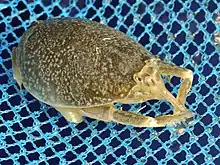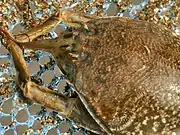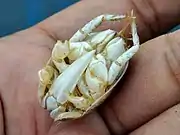Hippa adactyla
Hippa adactyla is a species of small, sand-burrowing decapod crustacean found living along the coasts of Indo-West Pacific waters. It is found on exposed sandy beaches in the swash region of the intertidal zone.
| Hippa adactyla | |
|---|---|
 | |
| Hippa adactyla, a 22-mm specimen from Palabuhanratu, Sukabumi Regency | |
| Scientific classification | |
| Kingdom: | |
| Phylum: | |
| Subphylum: | |
| Class: | |
| Order: | |
| Infraorder: | |
| Family: | |
| Genus: | |
| Species: | H. adactyla |
| Binomial name | |
| Hippa adactyla | |
| Synonyms | |
| |
Description


A small crustacean. Carapace ovate, more long than wide; neotype measurements: 25.1 mm × 22.5 mm.[3] Females tends to have larger bodies than males; on the southern coast of Java, the carapace length is 17.6–34.9 mm in females or 18.1–27.7 in males.[4]
According to Haig (1974):[5]
- "Carapace densely covered with sharply serrate, transverse lines. Frontal margin five-toothed; outer pair narrow, triangular, and sharp-pointed, and in adults projecting well beyond inner ones; inner pair rounded; between them a small median denticle, broadly triangular and scarcely produced. A row of 50–55 shallow, setiferous, slightly elongate pits near each lateral margin, forming a narrow band. Antennal flagellum with 3–6 articles, the number increasing with age. Dactyl of second and third legs deeply falcate, distal and proximal portions of the concave margin meeting at a right angle."
Distribution

Hippa adactyla occurs in Indo-West Pacific waters: from Madagascar eastward to the Marquesas Islands, northward to Japan (Misaki, Sagami Bay), and southward to Queensland (Australia).[6]
This small crustacean is especially found on sandy bottoms of low intertidal to shallow subtidal.[6]
In Malaysia, the crustaceans are locally known as Yat Yat or Ibu Remis. They can be found along the beaches in Kelantan during the monsoon season. The crustaceans are a local delicacy that is usually fried with eggs or roasted on a skewer like satay.[7]
Uses
Known locally as yutuk in southern coasts of Central Java, this crustacean is often caught by local people and cooked as a delicacy.[4]
References
- Johan Christian Fabricius (1787). Mantissa insectorum sistens eorum species nuper detectas adiectis characteribus genericis, differentiis specificis, emendationibus, observationibus... Vol. I. Copenhagen: C.G. Proft. p. 329.
- Pierre André Latreille (1806). Genera crustaceorum et insectorum : secundum ordinem naturalem in familias disposita, iconibus exemplisque plurimis explicata. Vol. I. Paris & Strasbourg: Apud Amand Knig, Bibliopolam. p. 45.
- J. Haig (1970). "The status of Remipes testudinarius Latreille, and designation of a neotype for Hippa adactyla J.C. Fabricius (Decapoda, Hippidae)". Crustaceana. 19 (3): 288–296. doi:10.1163/156854070x00374. JSTOR 20101744.
- W. Muzammil; Y. Wardiatno; N. A. Butet (2015). "Rasio panjang-lebar karapas, pola pertumbuhan, faktor kondisi, dan faktor kondisi relatif kepiting pasir (Hippa adactyla) di pantai berpasir Cilacap dan Kebumen" (PDF). Jurnal Ilmu Pertanian Indonesia (in Indonesian). 20 (1): 78–84.
- J. Haig (1974). "A review of the Australian crabs of the family Hippidae (Crustacea, Decapoda, Anomura)" (PDF). Memoirs of the Queensland Museum. 71: 175–189.
- M. Osawa. "Hippa adactyla Fabricius, 1787". BiotaTaiwanica. Retrieved 24 January 2016.
- Nor Amalina Alias (13 December 2020). "Seronok kutip Yat Yat [METROTV]". Harian Metro (in Malay). Retrieved 29 August 2021.
External links
- Christopher B. Boyko (2015). "Hippa adactyla Fabricius, 1787". WoRMS. World Register of Marine Species.
- BISMaL: Hippa adactyla
- MNHN: Hippa adactyla (history, archaeology)